🟢 Mung Beans | Premium-Grade Whole Green Gram for Food and Export
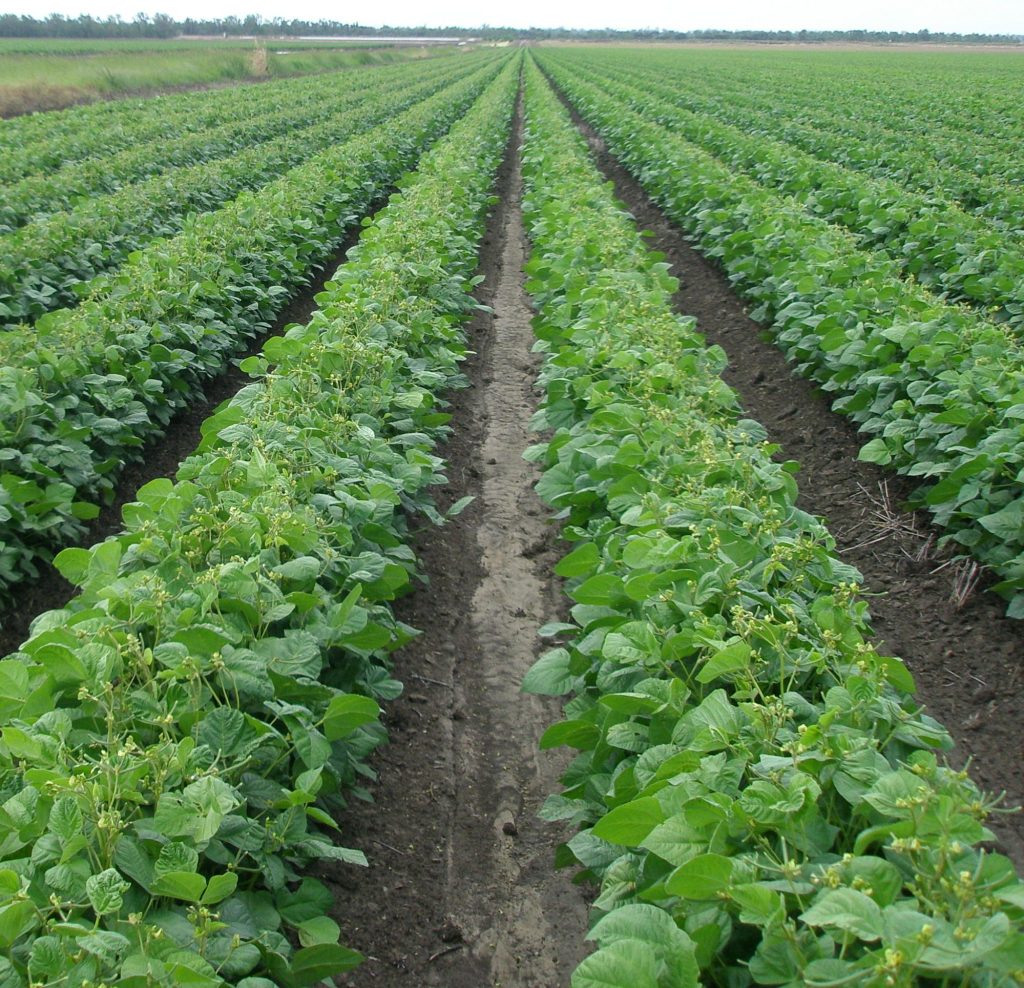
Type: Whole Green Gram (Vigna radiata)
Color: Bright to dark green
Texture: Smooth, oval, hard-skinned
Flavor: Mild, earthy, nutty
Certifications: ISO, HACCP, Halal, Kosher, Non-GMO, Organic (optional)
Origins: Myanmar, China, Uzbekistan, India, Tanzania
🌱 What Are Mung Beans?
Mung beans are a versatile, nutrient-dense legume widely used in Asian, Middle Eastern, and African cuisines. Known for their high protein, easy digestibility, and quick cooking properties, mung beans are ideal for soups, dals, flour, noodles, snacks, and sprouting.
They are increasingly in demand for plant-based and vegan product lines.
🔸 Available Types of Mung Beans
| Type | Description |
|---|---|
Whole Green Mung Beans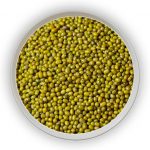 | Unprocessed, shiny green beans for food and sprouting |
Organic Mung Beans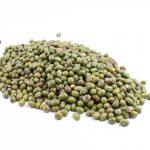 | Certified EU/USDA organic, chemical-free cultivation |
Polished Mung Beans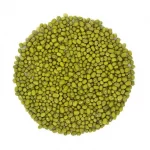 | Glossy finish for premium packaging |
Sprouting Grade Mung Beans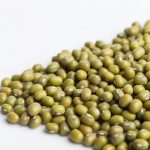 | High germination rate, low microbial load |
Feed Grade Mung Beans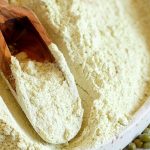 | For livestock, less strict on appearance |
Split/Dehusked Mung (Moong Dal)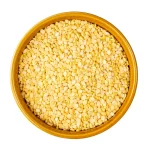 | Dehulled version for dals and flours |
✅ Calibrated sizes available (3.0 mm – 4.5 mm)
✅ Germination testing available for sprouting-grade orders
📋 Product Specifications
| Parameter | Specification |
|---|---|
| Purity | ≥ 99% |
| Moisture | ≤ 13.5% |
| Foreign Matter | ≤ 0.5% |
| Broken/Cracked | ≤ 2–3% |
| Grain Size | 3.5 mm – 4.5 mm (customizable) |
| Shelf Life | 24 months (dry, cool storage) |
| Color | Green, uniform |
📦 Packaging Options
| Format | Weight | Use Case |
|---|---|---|
| PP/Jute Bags | 25 kg / 50 kg | Bulk food processors, export |
| Big Bags (FIBC) | 1000 kg | Industrial, sprouting producers |
| Retail Packs | 500 g – 2 kg | Grocery and private label |
| Custom OEM Packs | Any size | Brand-specific needs |
♻️ Biodegradable, vacuum, and nitrogen-flushed options available on request.
🚚 Logistics & Supply Chain
Origin Countries: Myanmar, Uzbekistan, Tanzania, India, China
MOQ: 20 MT (1 FCL)
Lead Time: 10–15 working days
Export Docs: CO, Phytosanitary, SGS, Packing List, Invoice
Main Ports: Yangon, Nhava Sheva, Dar es Salaam, Qingdao
🍽️ Applications
Cooking (soups, stews, dals)
Sprouting for salads and health foods
Mung bean flour, noodles, snacks
Vegan protein blends and powders
Animal feed (feed-grade)
📑 What’s Included
Cleaned, machine-sorted mung beans
Sprouting-grade or cooking-grade options
Export documentation as required
Packaging tailored to your supply chain
Certificates (Organic, Halal, SGS, etc.)
❓ FAQs
Q: Do you supply sprouting-grade mung beans?
A: Yes, we offer mung beans with high germination rate and low microbial load for sprouting.
Q: Are organic mung beans available?
A: Certified organic mung beans are available from select origins (India, China, Tanzania).
Q: Can I request specific grain sizes or moisture content?
A: Absolutely. We can provide size grading and moisture adjustments based on your application.
✅ Why Choose NNRV for Mung Beans?
🟢 Cleaned & Calibrated – Food-grade or sprouting-ready
🌱 Organic & Non-GMO Supply – Fully traceable lots
📦 Flexible Packaging – From FIBC bulk to 500g retail pouches
📜 Documentation Ready – CO, SGS, Organic, Phytosanitary
🌍 Global Sourcing – Year-round availability from major origins
📩 Request Your Mung Bean Quote Now
Whether you’re in retail, food processing, or sprouting, NNRV delivers reliable mung bean solutions tailored to your format and quality needs.
📬 [Contact us for samples, pricing, and specifications]
🟢 Mung Beans | Premium-Grade Whole Green Gram for Food and Export
Bulk Mung Beans Supplier | Organic, Sprouting, and Export Grade
Product Overview
- Type: Whole Green Gram (Vigna radiata)
- Color: Bright to dark green
- Texture: Smooth, oval, hard-skinned
- Flavor: Mild, earthy, nutty
- Certifications: ISO, HACCP, Halal, Kosher, Non-GMO, Organic (optional)
- Origins: Myanmar, China, Uzbekistan, India, Tanzania
🌱 What Are Mung Beans?
Mung beans are a versatile, nutrient-dense legume widely used in Asian, Middle Eastern, and African cuisines. Known for their high protein, easy digestibility, and quick cooking properties, mung beans are ideal for soups, dals, flour, noodles, snacks, and sprouting. They are increasingly in demand for plant-based and vegan product lines.
🔸 Available Types of Mung Beans
| Type | Description |
|---|---|
| Whole Green Mung Beans | Unprocessed, shiny green beans for food and sprouting |
| Organic Mung Beans | Certified EU/USDA organic, chemical-free cultivation |
| Polished Mung Beans | Glossy finish for premium packaging |
| Sprouting Grade Mung Beans | High germination rate, low microbial load |
| Feed Grade Mung Beans | For livestock, less strict on appearance |
| Split/Dehusked Mung (Moong Dal) | Dehulled version for dals and flours |
📋 Product Specifications
| Parameter | Specification |
|---|---|
| Purity | ≥ 99% |
| Moisture | ≤ 13.5% |
| Foreign Matter | ≤ 0.5% |
| Broken/Cracked | ≤ 2–3% |
| Grain Size | 3.5 mm – 4.5 mm (customizable) |
| Shelf Life | 24 months (dry, cool storage) |
| Color | Green, uniform |
📦 Packaging Options
| Format | Weight | Use Case |
|---|---|---|
| PP/Jute Bags | 25 kg / 50 kg | Bulk food processors, export |
| Big Bags (FIBC) | 1000 kg | Industrial, sprouting producers |
| Retail Packs | 500 g – 2 kg | Grocery and private label |
| Custom OEM Packs | Any size | Brand-specific needs |
♻️ Biodegradable, vacuum, and nitrogen-flushed options available on request.
🚚 Logistics & Supply Chain
- Origin Countries: Myanmar, Uzbekistan, Tanzania, India, China
- MOQ: 20 MT (1 FCL)
- Lead Time: 10–15 working days
- Export Docs: CO, Phytosanitary, SGS, Packing List, Invoice
- Main Ports: Yangon, Nhava Sheva, Dar es Salaam, Qingdao
🍽️ Applications
- Cooking (soups, stews, dals)
- Sprouting for salads and health foods
- Mung bean flour, noodles, snacks
- Vegan protein blends and powders
- Animal feed (feed-grade)
📑 What’s Included
- Cleaned, machine-sorted mung beans
- Sprouting-grade or cooking-grade options
- Export documentation as required
- Packaging tailored to your supply chain
- Certificates (Organic, Halal, SGS, etc.)
❓ FAQs
- Q: Do you supply sprouting-grade mung beans?
A: Yes, high germination rate and low microbial load. - Q: Are organic mung beans available?
A: Certified organic mung beans are available from select origins (India, China, Tanzania). - Q: Can I request specific grain sizes or moisture content?
A: Absolutely. Size grading and moisture adjustments are possible based on application.
✅ Why Choose NNRV for Mung Beans?
- 🟢 Cleaned & Calibrated – Food-grade or sprouting-ready
- 🌱 Organic & Non-GMO Supply – Fully traceable lots
- 📦 Flexible Packaging – From FIBC bulk to 500g retail pouches
- 📜 Documentation Ready – CO, SGS, Organic, Phytosanitary
- 🌍 Global Sourcing – Year-round availability from major origins
📩 Request Your Mung Bean Quote Now
Whether you’re in retail, food processing, or sprouting, NNRV delivers reliable mung bean solutions tailored to your format and quality needs.
Mung Beans Processing & 50 Finished Products
From Raw Mung Beans to Retail, Sprouting, Flour, Snacks, and Industrial Applications
Introduction: Turning Mung Beans into Value
Mung beans are versatile raw materials. Through careful cleaning, sorting, grading, packaging, and optional sprouting, they can be transformed into a wide range of high-value food, health, and industrial products. Proper processing preserves nutrients, flavor, texture, and ensures safety while meeting international food standards.
Step-by-Step Mung Bean Processing
- Cleaning: Remove stones, dirt, and foreign matter to achieve ≥99% purity.
- Sorting & Grading: Calibrate beans by size (3.0–4.5 mm) and select for sprouting, cooking, or industrial use.
- Dehusking/Splitting: Optional processing for moong dal/flour production.
- Sprouting: Controlled germination for high-quality sprouts.
- Packaging: PP bags, FIBC bulk bags, retail pouches, vacuum or nitrogen-flushed packs.
- Quality Control: Purity, moisture (≤13.5%), microbial load, broken beans (≤3%), SGS/ISO/HACCP certifications.
- Storage & Logistics: Cool, dry storage; maintain quality during transport.
- Custom Labeling: Private label and retail-ready packaging available.
- By-product Handling: Broken beans, husks, or flour can be used for animal feed or industrial applications.
- Inspection & Certification: Optional SGS/Bureau Veritas inspection for global compliance.
50 Finished Products Derived from Mung Beans
- Whole Green Mung Beans – Food & sprouting grade
- Organic Mung Beans – Certified chemical-free
- Polished Mung Beans – Premium appearance for retail
- Sprouting Grade Mung Beans – High germination, low microbial load
- Feed Grade Mung Beans – Livestock feed applications
- Split/Dehusked Mung (Moong Dal) – Cooking & flour
- Mung Bean Flour – Baking and protein powder
- Sprouted Mung Bean Kits – Retail-ready sprouts
- Mung Bean Snacks – Roasted, coated, or flavored
- Private Label Mung Bean Packs – Custom retail packaging
- Green Gram Paste – Ready-to-cook product
- Mung Bean Noodles – Traditional and instant noodles
- Mung Bean Protein Powder – Plant-based protein supplement
- Fermented Mung Bean Products – Tempeh, miso alternatives
- Mung Bean Soup Mixes – Instant and dry blends
- Vegan Mung Bean Burgers – Plant-based patty
- Mung Bean Curry Kits – Ready-to-cook seasoning packs
- Sprouting-Friendly Bulk Mung Beans – For food service and health stores
- Split Mung Beans – For dal and traditional dishes
- Mung Bean Snacks with Coatings – Sweet or savory flavors
- Mung Bean Cereal Mixes – Breakfast-ready
- Mung Bean Energy Bars – Protein-rich snack
- Mung Bean Pancake Mix – Gluten-free option
- Mung Bean Beverage Powder – Plant milk or drink base
- Mung Bean Baby Food – Fortified puree
- Ready-to-Sprout Retail Packs – Vacuum-sealed sprouts
- Mung Bean Instant Flour – Pre-cooked and milled
- Mung Bean Pet Food – Protein ingredient
- Industrial Mung Bean Meal – For extrusion or ingredient blending
- Mung Bean Paste Snacks – Sweet or savory fillings
- Frozen Sprouted Mung Beans – For ready-to-use meals
- Dehusked Mung Bean Fractions – For starch or industrial use
- Mung Bean Soup Base – Seasoned, packaged for HORECA
- Mung Bean Salad Mix – Pre-cooked, chilled packs
- Mung Bean Wrap Kits – Health-conscious meal prep
- Private Label Vegan Meal Packs – Mung-based protein
- Mung Bean Dessert Mixes – Sweet traditional dishes
- Mung Bean Protein Snack Balls – Healthy energy bites
- Mung Bean Flour Mixes – Pancakes, bread, or pasta
- Mung Bean Granules – Instant cooking additive
- Mung Bean Snack Chips – Baked or roasted
- Mung Bean Freeze-Dried – Retains nutrients for instant use
- Mung Bean Instant Soup Packs – Retail & HORECA
- Mung Bean Vegan Nuggets – Plant protein alternative
- Mung Bean Stir-Fry Portions – Ready-to-cook packs
- Mung Bean Sprout Powder – Nutrition supplement
- Mung Bean Cooking Paste – Ready-to-use for sauces
- Mung Bean Frozen Packs – For retail and food service
- Organic Sprouting Kits – Retail-ready trays
- Mung Bean Flour Bulk Bags – Industrial supply
- Private Label Gourmet Mung Bean Products – Retail and premium lines
FAQs – Processing & Products
- Do you supply sprouting-grade mung beans? Yes, with high germination rate and low microbial load.
- Are organic mung beans available? Yes, from select origins (India, China, Tanzania).
- Can mung beans be dehusked or split? Yes, for moong dal and flour production.
- What export formats are offered? PP bags, FIBC, retail packs, vacuum or nitrogen-flushed options.
- What is the shelf life? 24 months under dry, cool storage.
- Can products be private-labeled? Yes, retail-ready packs or bulk packaging can be branded for clients.
- What by-products are generated? Broken beans or husks can be used for animal feed or flour.
- How is quality ensured? Purity, moisture, microbial testing, and certifications like ISO, HACCP, SGS.
- Are there custom size options? Yes, calibrated from 3.0–4.5 mm for different applications.
📩 Transform Your Mung Beans Into Market-Ready Products
NNRV helps you source, process, and distribute mung beans for retail, sprouting, food processing, and industrial applications. From raw mung beans to 50 finished products, we provide full traceability, quality assurance, and global logistics support.
Contact us now to explore processing options and request your bulk or private-label mung bean products.
Mung Beans Processing & 50 Finished Products
From Raw Mung Beans to Retail, Sprouting, Flour, Snacks, and Industrial Applications
Introduction: Turning Mung Beans into Value
Mung beans are versatile raw materials. Through careful cleaning, sorting, grading, packaging, and optional sprouting, they can be transformed into a wide range of high-value food, health, and industrial products. Proper processing preserves nutrients, flavor, texture, and ensures safety while meeting international food standards.
Step-by-Step Mung Bean Processing
- Cleaning: Remove stones, dirt, and foreign matter to achieve ≥99% purity.
- Sorting & Grading: Calibrate beans by size (3.0–4.5 mm) and select for sprouting, cooking, or industrial use.
- Dehusking/Splitting: Optional processing for moong dal/flour production.
- Sprouting: Controlled germination for high-quality sprouts.
- Packaging: PP bags, FIBC bulk bags, retail pouches, vacuum or nitrogen-flushed packs.
- Quality Control: Purity, moisture (≤13.5%), microbial load, broken beans (≤3%), SGS/ISO/HACCP certifications.
- Storage & Logistics: Cool, dry storage; maintain quality during transport.
- Custom Labeling: Private label and retail-ready packaging available.
- By-product Handling: Broken beans, husks, or flour can be used for animal feed or industrial applications.
- Inspection & Certification: Optional SGS/Bureau Veritas inspection for global compliance.
50 Finished Products Derived from Mung Beans
- Whole Green Mung Beans – Food & sprouting grade
- Organic Mung Beans – Certified chemical-free
- Polished Mung Beans – Premium appearance for retail
- Sprouting Grade Mung Beans – High germination, low microbial load
- Feed Grade Mung Beans – Livestock feed applications
- Split/Dehusked Mung (Moong Dal) – Cooking & flour
- Mung Bean Flour – Baking and protein powder
- Sprouted Mung Bean Kits – Retail-ready sprouts
- Mung Bean Snacks – Roasted, coated, or flavored
- Private Label Mung Bean Packs – Custom retail packaging
- Green Gram Paste – Ready-to-cook product
- Mung Bean Noodles – Traditional and instant noodles
- Mung Bean Protein Powder – Plant-based protein supplement
- Fermented Mung Bean Products – Tempeh, miso alternatives
- Mung Bean Soup Mixes – Instant and dry blends
- Vegan Mung Bean Burgers – Plant-based patty
- Mung Bean Curry Kits – Ready-to-cook seasoning packs
- Sprouting-Friendly Bulk Mung Beans – For food service and health stores
- Split Mung Beans – For dal and traditional dishes
- Mung Bean Snacks with Coatings – Sweet or savory flavors
- Mung Bean Cereal Mixes – Breakfast-ready
- Mung Bean Energy Bars – Protein-rich snack
- Mung Bean Pancake Mix – Gluten-free option
- Mung Bean Beverage Powder – Plant milk or drink base
- Mung Bean Baby Food – Fortified puree
- Ready-to-Sprout Retail Packs – Vacuum-sealed sprouts
- Mung Bean Instant Flour – Pre-cooked and milled
- Mung Bean Pet Food – Protein ingredient
- Industrial Mung Bean Meal – For extrusion or ingredient blending
- Mung Bean Paste Snacks – Sweet or savory fillings
- Frozen Sprouted Mung Beans – For ready-to-use meals
- Dehusked Mung Bean Fractions – For starch or industrial use
- Mung Bean Soup Base – Seasoned, packaged for HORECA
- Mung Bean Salad Mix – Pre-cooked, chilled packs
- Mung Bean Wrap Kits – Health-conscious meal prep
- Private Label Vegan Meal Packs – Mung-based protein
- Mung Bean Dessert Mixes – Sweet traditional dishes
- Mung Bean Protein Snack Balls – Healthy energy bites
- Mung Bean Flour Mixes – Pancakes, bread, or pasta
- Mung Bean Granules – Instant cooking additive
- Mung Bean Snack Chips – Baked or roasted
- Mung Bean Freeze-Dried – Retains nutrients for instant use
- Mung Bean Instant Soup Packs – Retail & HORECA
- Mung Bean Vegan Nuggets – Plant protein alternative
- Mung Bean Stir-Fry Portions – Ready-to-cook packs
- Mung Bean Sprout Powder – Nutrition supplement
- Mung Bean Cooking Paste – Ready-to-use for sauces
- Mung Bean Frozen Packs – For retail and food service
- Organic Sprouting Kits – Retail-ready trays
- Mung Bean Flour Bulk Bags – Industrial supply
- Private Label Gourmet Mung Bean Products – Retail and premium lines
FAQs – Processing & Products
- Do you supply sprouting-grade mung beans? Yes, with high germination rate and low microbial load.
- Are organic mung beans available? Yes, from select origins (India, China, Tanzania).
- Can mung beans be dehusked or split? Yes, for moong dal and flour production.
- What export formats are offered? PP bags, FIBC, retail packs, vacuum or nitrogen-flushed options.
- What is the shelf life? 24 months under dry, cool storage.
- Can products be private-labeled? Yes, retail-ready packs or bulk packaging can be branded for clients.
- What by-products are generated? Broken beans or husks can be used for animal feed or flour.
- How is quality ensured? Purity, moisture, microbial testing, and certifications like ISO, HACCP, SGS.
- Are there custom size options? Yes, calibrated from 3.0–4.5 mm for different applications.
📩 Transform Your Mung Beans Into Market-Ready Products
NNRV helps you source, process, and distribute mung beans for retail, sprouting, food processing, and industrial applications. From raw mung beans to 50 finished products, we provide full traceability, quality assurance, and global logistics support.
Contact us now to explore processing options and request your bulk or private-label mung bean products.
Mung Beans Processing Facilities: 10 Leading Plants, Methods & Financing
Global Production – From Raw Mung Beans to Retail, Sprouting, Flour, Snacks, and Industrial Applications
Introduction: Setting Up and Operating Mung Bean Processing Plants
Mung beans require specialized processing to convert raw legumes into high-value products such as retail packs, sprouting kits, flour, snacks, and industrial ingredients. Efficient facilities maintain quality, reduce waste, and comply with international food safety standards. This article explores 10 model processing plants, methods, operational structures, and financing strategies.
Top 10 Mung Bean Processing Facilities Globally
- India – Gujarat Green Gram Co. Specializes in whole and split mung beans for export. ISO & HACCP certified with advanced sorting and dehusking lines.
- China – Shandong Pulse Processing Large-scale facility producing retail-ready mung beans and sprouting-grade packs. Automated grading and packaging systems.
- Myanmar – Yangon Pulse Mills Focus on high-quality export for Asia and Europe. Offers organic and conventional beans.
- Uzbekistan – Samarkand Legume Plant Mid-size plant for cleaning, grading, and private-label packaging.
- Tanzania – Dar Mung Co. Produces sprouting-grade and feed-grade mung beans for domestic and export markets.
- Thailand – Bangkok Pulses Integrated plant for cleaning, sorting, dehusking, and bulk export. ISO & BRC certified.
- Vietnam – Hanoi Green Legumes Focus on retail-ready packs and ready-to-sprout kits. Automated packaging lines.
- Egypt – Cairo Bean Mills High-efficiency cleaning, grading, and packaging. Serves EU and MENA markets.
- Australia – Queensland Bean Processing Specializes in organic mung beans and high-purity export products.
- USA – California Pulse Solutions Produces mung bean flour, snacks, and private-label retail packs. HACCP & ISO certified.
Processing Methods Across Facilities
- Cleaning & Sorting: Remove debris, stones, and damaged beans; calibrate by size.
- Dehusking & Splitting: Optional for dal and flour production.
- Sprouting: Controlled germination for retail-ready sprouts.
- Packaging: Retail, bulk, vacuum, or nitrogen-flushed options.
- Quality Control: Purity ≥99%, moisture ≤13.5%, microbial testing, broken beans ≤3%, ISO/HACCP compliance.
- Cold Storage: Maintain dry, cool storage for freshness.
- By-product Utilization: Broken beans or husks used for animal feed or industrial use.
- Inspection & Certification: Optional SGS/Bureau Veritas inspection for exports.
Typical Plant Structure & Layout
- Raw Material Intake: Refrigerated or dry storage, conveyors, initial inspection.
- Processing Area: Cleaning, sorting, dehusking, sprouting zones.
- Packaging & Quality Control: Retail, bulk, and vacuum packaging with QC stations.
- Storage & Logistics: Cool, dry storage and export-ready cold chain facilities.
- Utilities & Support: Power backup, water treatment, environmental control.
- Administrative Area: Offices, control room, and logistics coordination.
- By-product Management: Broken beans, husks, and flour collection or disposal.
Financing Mung Bean Processing Plants
- Equity Investment: Private or corporate investors fund construction and initial operations.
- Bank Loans: Term loans or working capital facilities for plant equipment and raw beans procurement.
- Project Financing: Secured against future sales; export-oriented plants benefit most.
- Supplier Credit: Equipment or raw material suppliers provide deferred payment or leasing options.
- Government Grants & Subsidies: Incentives for organic, sustainable, or export-focused production.
- Joint Ventures: Partnerships with retailers, sprouting brands, or downstream processors.
- Export Credit Agencies: Support for international shipments and export-ready operations.
FAQs – Processing Facilities & Financing
- What is the minimum size for a mung bean plant? Small plants start at 5–10 MT/day; industrial plants range 50–500 MT/day.
- How much does it cost to build a processing plant? Small plant $300k–$800k; large industrial facility $3–10M depending on technology and automation.
- Which countries are favorable for setup? India, China, Myanmar, Uzbekistan, Tanzania, Thailand, Vietnam, Egypt, Australia, USA – due to raw material availability and export logistics.
- Which processing method is best for sprouting-grade beans? Sorting, calibration, and controlled germination for high germination rate and low microbial load.
- Can by-products generate revenue? Yes – broken beans, husks, and flour for feed or industrial applications.
- How is quality maintained? SOPs, ISO/HACCP certifications, microbial and moisture testing, continuous staff training.
- Are joint ventures common? Yes – collaborations with sprouting brands or retailers reduce risk and secure offtake agreements.
- Is export financing available? Yes – through banks, export credit agencies, and structured project financing.
- How long does it take to set up a plant? Typically 6–12 months for small-medium plants; 12–24 months for large industrial facilities.
- Are there environmental considerations? Yes – proper waste handling, water efficiency, dust control, and energy management are essential.
📩 Start Your Mung Bean Processing Venture
NNRV Trade Partners provides advisory, financing, and logistics support to establish, expand, or optimize mung bean processing facilities. From plant design to equipment selection and export-ready production, we help investors and entrepreneurs maximize returns while maintaining quality and compliance.
Contact us now to explore plant options, financing strategies, and global market opportunities.
Global Mung Beans Market: Production, Trade, Sustainability & Future Outlook
Top Producers, Exporters, Importers – Quality Control, Traceability & Strategic Insights
Introduction: Why Mung Beans Are Critical Globally
Mung beans are a nutrient-dense legume widely used in retail, food processing, sprouting kits, flours, snacks, and plant-based protein products. Rising global demand for plant-based, high-protein, and easily digestible ingredients drives trade in mung beans.
Top 20 Mung Bean Producing Countries (2024 estimates)
- India – 1.2M MT
- China – 1.0M MT
- Myanmar – 0.45M MT
- Uzbekistan – 0.4M MT
- Tanzania – 0.35M MT
- Thailand – 0.3M MT
- Vietnam – 0.28M MT
- Egypt – 0.25M MT
- Australia – 0.22M MT
- USA – 0.2M MT
- Bangladesh – 0.18M MT
- Pakistan – 0.15M MT
- Canada – 0.12M MT
- Indonesia – 0.1M MT
- Philippines – 0.09M MT
- South Korea – 0.08M MT
- Japan – 0.07M MT
- Malaysia – 0.06M MT
- Kenya – 0.05M MT
- Nepal – 0.04M MT
Top 20 Mung Bean Exporters
- India
- China
- Myanmar
- Uzbekistan
- Tanzania
- Thailand
- Vietnam
- Egypt
- Australia
- USA
- Bangladesh
- Pakistan
- Canada
- Indonesia
- Philippines
- South Korea
- Japan
- Malaysia
- Kenya
- Nepal
Top 20 Mung Bean Importers
- Japan
- USA
- Germany
- Italy
- UK
- France
- Netherlands
- UAE
- Saudi Arabia
- South Korea
- Egypt
- Vietnam
- Poland
- Spain
- Mexico
- Philippines
- Canada
- Turkey
- Malaysia
- Singapore
Global Production & Trade Statistics
- Total global production: ~5.0M MT annually
- Global exports: ~2.2M MT
- Global imports: ~2.1M MT
- Average bean yield per hectare: 0.9–1.2 MT/ha
- Projected demand growth 2025–2030: +3–5% CAGR
- Mung beans represent a significant share of global pulse trade.
Traceability, Certifications & Quality Control
- Full Traceability: Farm origin, cleaning batch, and shipment tracking.
- Certifications: ISO 22000, HACCP, BRC, Halal, Organic, Non-GMO.
- Food Safety: Microbiological testing, moisture control, pathogen checks.
- Sustainability: Responsible sourcing, reduced water footprint, ethical farming practices.
- Industry Compliance: Organic, Halal, allergen-free labeling for global markets.
Strategic Insights & Future Importance
- Rising demand in retail, sprouting kits, flour, snacks, and plant-based protein markets.
- Growth in ready-to-use, portion-controlled, and sprouting-grade products.
- Opportunities in value-added products: Split dal, polished beans, organic packs, private-label packaging.
- Focus on quality-controlled cleaning, grading, and packaging to access premium markets.
- Investment in automated processing plants near production hubs reduces cost and increases freshness.
- Traceable and certified products gain access to high-value markets.
- Export diversification reduces geopolitical and supply risks.
- Sustainability and ESG branding differentiate products in health-conscious markets.
📩 Join the Global Mung Beans Market
NNRV Trade Partners connects producers, processors, and buyers worldwide. From sourcing, certification, and quality assurance to logistics and financing, we provide end-to-end support for global mung bean trade.
Contact us today to secure supply, explore new markets, or optimize your mung bean operations with traceable, safe, and premium-grade products.